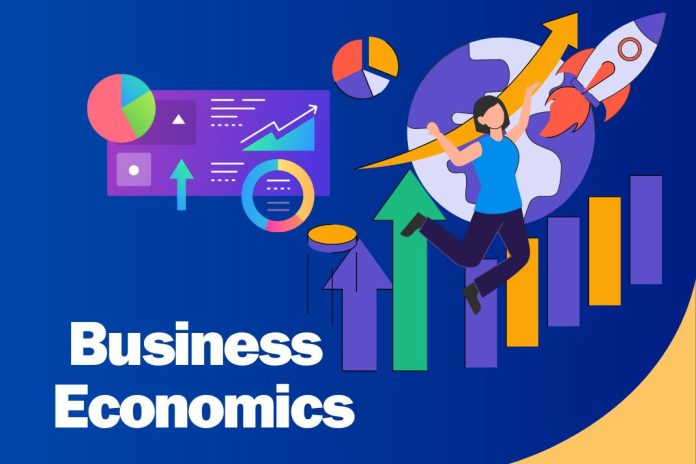Business economics is the part of economics that is related to economic activities, and its goal is growth and gaining profits in business. Every business has some resources; those who correctly use those resources will succeed, so this tells us how to use resources for maximum profit.
Managerial economics combines economic theories with business practice so that we can efficiently make business decisions and future planning by management. It is an application of economics theories and business methodology. Economics theories provide tools, and this utilizes these tools in decision-making.
Sometimes, business economics is also known as managerial economics because managers use economics to make decisions. managerial economics plays an important role in business practices and economic life.
Different economists have different definitions of economics, but the meaning is that applications of economic concepts, theories, and tools in business decision-making are called business economics or managerial economics.
Types Of Business Economics
Microeconomics
It is the study of individual units of the economy. It deals with micro variables such as the price of an item, supply of a factor of production, demand for a material, etc. It is also called price theory because it analyzes the allocation of resources based on the relative processes of various goods and services. It is the basis of the price mechanism, which depends on demand and supply.
Macroeconomics
The study of the aggregates in economics is known as macroeconomics. This is also referred to as aggregative economics. It does not deal with individual quantities but with aggregates of the amounts, income, price level, and output. Macroeconomics focuses on implementing policies and principles and solving issues related to achieving full employment and developing economic resources.
Financial Economics
Economics mainly focuses on the behaviour of financial markets, businesses, and equipment. It covers corporate finance, asset pricing, portfolio concepts, threat management, and capital budgeting. Businesses use financial economics to control financial risks, determine what to spend money on, and raise prices.
International Economics
This field covers how multiple nations interact economically, discussing funding, change rates, global finance, and other economic changes. Organizations operating in foreign markets require a strong understanding of international economics to manage currency risks, facilitate cross-border transactions, and profit from worldwide possibilities.
Managerial Economics
Managers use proper resource allocation, pricing strategies, production decisions, funding choices, and other business enterprise methods to maximize earnings and achieve organizational objectives.
Best Characteristics Of Business Economics
- Business economics is a part of business management. Management uses managerial economics to make decisions.
- Business economics is microeconomics in nature.
- It is not completely theoretical; it is a practical concept. Theories are combined with practical theories.
- Managerial economics also utilizes some of the theories of macroeconomics.
- Managerial economics is goal-oriented and problem-solving in nature.
- It takes an interdisciplinary approach, incorporating statistics, mathematics, marketing, and accounting disciplines.
Scope Of The Business Economics
Demand Analysis And Forecasting
Business economics helps direct organizations in arranging production schedules and handling resources. It offers guidance for modification and aids in identifying various factors guiding product demand.
Cost And Production Analysis
Managerial economics requires price estimations for producing several products and identifying the reasons for expected price variations. In addition to preventing time and material waste to achieve the targeted profit percentage, it helps limit production levels.
Pricing Policies
The company’s earnings are rooted in valuation. Costing decisions largely determine its success. managerial economics focuses on aspects of containing pricing methods and price discovery in many market forms.
Profit Management
Organizations must frame a more or less exact evolution of the company’s expected gains and pricing at a clear output level. managerial economics focuses on profit calculation and profit planning.
Capital Operations
Capital investments are the most complex problem. Planning and controlling capital expenditure suggests capital operations. The main concepts under capital management are the cost of capital, rate of return, and design section.
A Career In Business Economics
Management Consultant
Management consultants advise businesses on strategic issues, operational improvements, and organizational reforms. Professionals with a managerial economics background are very helpful in areas such as cost analysis, marketplace assessment, and efficiency management.
Financial Analyst
Financial analysts examine the typical financial performance of a company, an employer, and an investment opportunity. They use economic analysis to determine risk, take into account factors affecting financial markets, and provide investment recommendations.
Academic Researcher
Those with backgrounds in business administration, economics, or similar fields may find employment as academic researchers or teachers. They deepen our knowledge of economics through their research and scholarly writing.
Entrepreneurship
Individuals with a background in enterprise economics may also choose to start their businesses or become self-employed specialists, use their skills to solve business issues and take advantage of business opportunities.
Market Research Analyst
Market research analysts actively monitor consumer behaviour, market trends, and competitive dynamics to help organizations understand their targets and develop effective advertising strategies in the market. Strong managerial economics knowledge is required to analyze pricing strategies, market segmentation, and development requests.
Conclusion
Business or Managerial economics provides many strategies for achieving profitable growth, improving productivity, and improving decision-making using economic concepts and analytical tools. In Managerial economics, we study micro, macro, international, financial, and managerial economics to gain a foundation for understanding and solving possibilities and economic challenges.
Learn About: Factors Influencing Business Ethics


